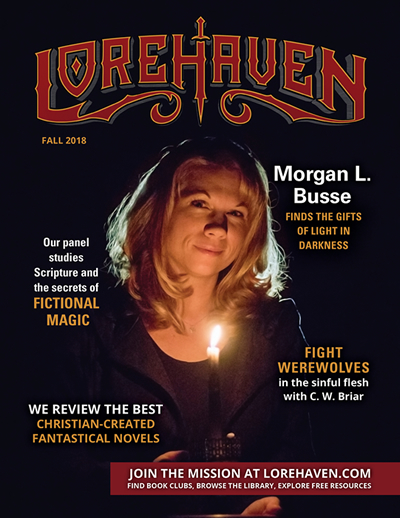The Christian Roots of Fantasy
On one Saturday evening at the women’s Bible conference, I’d just sold my last book. I was heading to the auditorium for my keynote talk when a nervous-looking young woman plucked my sleeve.
“Excuse me,” she stammered. “Could I ask you why you write books”—her voice dropped to a whisper—“like that?”
“You mean fantasy?” I asked, smiling at her.
She nodded, eyes wide with anxiety and fear.
I didn’t have much time to spare, but my heart went out to her. It wasn’t hard to guess what she believed: that fantasy stories glorify witchcraft, paganism, and the occult, and no serious Christian should have anything to do with them. Especially not one of the main speakers at a Bible conference!
Yet I didn’t feel defensive, because I didn’t need to. Instead, I was happy to tell the young woman why I love fantasy, because this genre offers an opportunity to illustrate biblical truths in a fresh way, and speak to people who might never have listened otherwise.
As C. S. Lewis wrote in “Sometimes Fairy Stories May Say Best What’s To Be Said”:
Why did one find it so hard to feel as one was told one ought to feel about God or about the sufferings of Christ? I thought the chief reason was that one was told one ought to. . . . But supposing that by casting all these things into an imaginary world, stripping them of their stained-glass and Sunday school associations, one could make them for the first time appear in their real potency? Could one not thus steal past those watchful dragons? I thought one could.
As I explained to my new friend, Lewis had good reason for believing in the power of Christian fantasy to change hearts. After all, the “Holiness” (as he called it) in George MacDonald’s Phantastes had “baptized” his atheist imagination and eventually helped lead him to faith in Christ.
“It’s okay if you don’t want to read fantasy,” I told her. “I wouldn’t ask you to do anything against your conscience. But you may be interested to know that all of the earliest and most influential fantasy stories were written by Christians.”
For example, John Bunyan wrote his fantasy allegory The Pilgrim’s Progress, widely considered to be the first novel in the English language.
Yet even before that came Edmund Spenser’s The Faerie Queene (1590), an allegorical poem celebrating Christian faith and biblical virtues such as holiness, temperance, chastity, and justice.
In both stories, heroes fight fantastic battles against supernatural, often monstrous foes, and ultimately triumph not by mere human strength but by the power of God.
Many of the stories we call “fairy tales” were also strongly influenced by Christianity.
In these folk tales, the Devil and his servants—witches, evil dwarves, and other malicious creatures—are portrayed as adversaries to be fought, not powers to be worshipped. Christian virtues such as compassion, humility, and faith are rewarded, while pride, avarice, and other sins are punished. And the heroes rarely succeed without supernatural help.
Bonus content
As for fairies themselves, even their origins are steeped in Christian theology.
Some Welsh and Icelandic people believed that fairies were the unwashed children of Eve, whom she tried to hide from God in shame for their dirty appearance. Others thought fairies were the souls of virtuous pagans who died before Christianity came.
The Irish who believed fairies were fallen angels used crosses, holy water, and other sacred items to repel them. And many of the superstitions about fairies were researched and written down by Christian clergymen, who were trying to better understand the people they hoped to reach.
In modern times, many scholars consider George MacDonald (1824–1905) the first true fantasy author. MacDonald was not only a poet and novelist but a Christian minister. His adult fantasy novels Lilith and Phantastes, along with children’s books like At the Back of the North Wind and The Princess and the Goblin, were a huge influence on later Christian authors like G. K. Chesterton, C. S. Lewis, J. R. R. Tolkien, and Madeleine L’Engle. His books even made an impact on the skeptic Mark Twain, who began by disliking MacDonald but later became friends with him.
Lewis and Tolkien, of course, scarcely need introduction, even to people who have never read them. Their epic tales of humble faith standing up against powerful evil, of selfless sacrifice and glorious resurrection, are deeply rooted in Christian theology and have influenced millions of readers and writers for decades.
Not everyone who reads The Lion, The Witch and the Wardrobe realizes at once that Aslan is the Narnian incarnation of Jesus, or that the Eru Ilúvatar of Tolkien’s The Silmarillion is the same Creator we find in Genesis.
But for anyone with even a passing knowledge of Christian theology, the biblical allusions in both Narnia and Middle-earth are too obvious to deny.
Sadly, modern general-market fantasy has largely lost touch with its biblical roots. Fans need discernment to find good stories. But many believing authors write fantasy in the secular as well as the religious markets. Readers appreciate the glimmers of spiritual truth in the books we write.
It is not (and never has been) true that fantasy belongs to paganism and the occult, even if some Christians may associate fantasy with hippies and drug culture in the 1960s and ’70s, and may recall the “Satanic Panic” of the ’80s.
Indeed, fantasy is no more “ungodly” than any other fiction genre, and in many ways fantasy is less ungodly. After all, other genres deny the existence of a supernatural realm, or pretend there’s no difference between good and evil. But it’s difficult for fantasy to do either without ceasing to be fantasy at all.
And that, as I told my young friend, is why I’m not ashamed to love fantasy, and why I don’t think any Christian needs to be ashamed of loving it either.



































Share your fantastical thoughts.